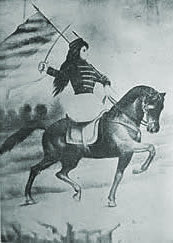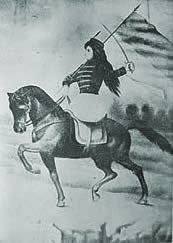
|
Women and Independence in Latin America An exploration of women's involvement in the Latin American Wars of Independence |

|

|
Women and Independence in Latin America An exploration of women's involvement in the Latin American Wars of Independence |

|
Author: Juana Manuela Gorriti de Belzú
Type of publication: Essay
Title: Women in the Fatherland
Year of publication: 0
Place created: Lima
Language: English
Location of text: Reproduced in Gabriella Nouzeillers and Graciela Montaldo, (eds.), The Argentine Reader, Duke University Press, Durham and London, 2002. Translated by Patricia Owen Steiner in Hallworth Library, University of Nottingham
Abstract: Essay in priase of Juana Azurduy de Padilla.
Content:
Now that the softness of our way of life has destroyed woman's strength of character and made her the slave of pleasure with no other guiding enthusiasm than vanity, with nothing more to worship than her own beauty, it is entirely good and proper to recall extraordinary women of another time. Those women who were guided by the precepts of the church and by the dictates of their own hearts, accompanied their husbands to all kinds of places, following them on the plains or in the mountains, on hillsides and on cliffs, solely because of loyalty to their country.
One of those heroines was Juana Azurduy, born in 1781 in Chuquisaca, Bolivia. Married at twenty four to Manuel Ascencio Padilla, beautiful and brave, on her wedding night she arose from her nuptial bed to follow her husband, Manuel, in the terrible war that the patriots waged against the hardened Spanish troops of Upper Peru.
While, from the Rio Grande to the Pilcomayo, Padilla was feared because of his courage and daring, Juana Azurduy herself, because of her virtue and (p.74) goodness, was beloved in equal measure by all those who had dealings with her. Her husband's followers found in her an affectionate mother.
After Padilla's army was driven back from its surprise attack on Chuquisaca. which was defended by the Spanish leader Colonel de la Hera, Juana Azurduy was entrusted by her husband to guard the village of El Villar. There, with bullets flying in all directions, she inspired those around her, for she knew how to rout the royalist troops that had attacked them. It was she who personally grabbed the flag of the [Spanish] Center Battalion from the hands of its standard bearer.
Days later, on 14 September 1816, she saw her husband fall at her side. Far from bending under that catastrophe that darkened her life, she buried her tears deep in her heart and recovered her spirit. Seizing the blue banner, she lifted high the symbol of free men and went on to lead her husband's troops in their most heroic battles.
When enemies besieged them for a month on an and hillside, she suffered the horrors of extreme thirst and hunger, but she set an example of the most stoic selflessness.
Some of the caudillos among her troops became envious of the glory she had won in battle and turned against her. Their hostility disheartened her, and soon after she found a new leader for her troops and withdrew to the United Provinces of the Rio de la Plata, where my father (who was in command in Salta at that time) received her with all the honors that are given to heroes.
There, in 1822, I, as a child, had the honor of knowing her. Praise for her great deeds floated before my eyes like clouds of incense encircling that extraordinary woman, shaping a halo around her. Memory of her is still vivid to me, and 1 can see her now in her long black robe with her serene, meditative countenance.
Padilla was one of the great leaders of that gigantic war. In those times, among soldiers, there was no higher rank than hero, and that is exactly what Padilla was. Later, the country made generals and marshals of some of the men who survived those deadly battles.
In 1824, when the Battle of Ayacucho brought freedom to Spanish America, Juana Azurduy left Salta to return to her own part of the world.
What became of her? She vanished like those stars that light up the skies and then become lost in the immensity of the universe.
Texts written by Juana Manuela Gorriti de Belzú:
Margarita Puch de Güemes
Women in the Fatherland